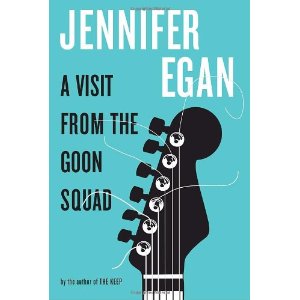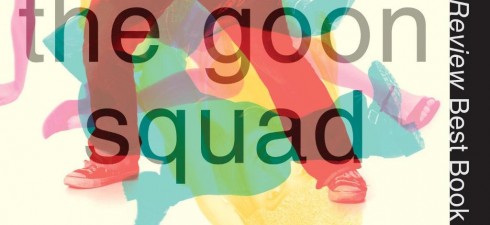Welcome back to Return and Report, a segment on Stacks where I give brief reports on what I’ve been reading or listening to lately. Today’s edition will feature an amazing book, which was was on my to do list for this year.
“Time’s a goon, right? You gonna let that goon push you around?”
 Jennifer Egan’s stunning Pulitzer Prize-winning book A Visit From the Goon Squad is the best book I’ve read this year and easily one of the best of the last five years. Goon Squad is difficult to describe; it’s neither a novel nor a collection of short stories, but something in between — a series of chapters featuring characters who are all loosely associated with the music industry and each other. The book moves like a relay race with the baton being passed in each chapter; major character handing off to minor character and time moving forwards and backwards over a span of about 40 years. Egan is flying high without a net, for not only does she take on the challenge of creating a cohesive whole from a cacophony of voices and settings, but she also writes each chapter in a different voice and tone. The book is technically dazzling and experimental, but Egan’s clear-eyed compassion for her characters is what makes it moving, darkly funny and a delight to read, whether she is writing about a struggling journalist who suddenly attacks the young celebrity he is meant to interview — skewering both celebrity interviews and the Nabokov-influenced writer, a record producer taking his sprawling, soon to be estranged family on safari in Africa, or a formerly powerful, now down on her luck publicist who secretly takes on a South American dictator as a client.
Jennifer Egan’s stunning Pulitzer Prize-winning book A Visit From the Goon Squad is the best book I’ve read this year and easily one of the best of the last five years. Goon Squad is difficult to describe; it’s neither a novel nor a collection of short stories, but something in between — a series of chapters featuring characters who are all loosely associated with the music industry and each other. The book moves like a relay race with the baton being passed in each chapter; major character handing off to minor character and time moving forwards and backwards over a span of about 40 years. Egan is flying high without a net, for not only does she take on the challenge of creating a cohesive whole from a cacophony of voices and settings, but she also writes each chapter in a different voice and tone. The book is technically dazzling and experimental, but Egan’s clear-eyed compassion for her characters is what makes it moving, darkly funny and a delight to read, whether she is writing about a struggling journalist who suddenly attacks the young celebrity he is meant to interview — skewering both celebrity interviews and the Nabokov-influenced writer, a record producer taking his sprawling, soon to be estranged family on safari in Africa, or a formerly powerful, now down on her luck publicist who secretly takes on a South American dictator as a client.
The goon of the book –time –is a palpable presence, and it subjects the characters to loss and dislocation, as well as connection and healing. The structure of the narrative reinforces a feeling that time is circular. Characters who are powerful in one chapter will be knocked flat in another chapter, only to find redemption in yet another. As a result, each character’s experience is imbued with both possibility and death, since the reader often knows the future successes and failures of the characters. Egan’s work is also a novel about memory, narrative and the desire — and failure — to find, connection, an exploration of the ways human beings can be mired in either nostalgia or a longing for the future, rarely content with where they are now.
Egan has said that the novel was inspired by Proust’s À la Recherche du Temps Perdu by Marcel Proust and HBO’s The Sopranos. She’s also described the structure of the book by comparing it to a concept album. In fact, the 13 chapters are split into the A side or the B side, and the book, loosely organized around the concepts of time and loss, varies tonally from chapter to chapter, in the way an album’s tone can vary from track to track, moving from a rousing rock stomp to a ballad. It is fitting that Egan chose the album, a disappearing art form in a time of singles and iTunes, to explore the vagaries of time. Egan’s characters are constantly confronting technology and how it changes the way they live and communicate.
One of the most moving and engrossing chapters in the book is set in the future and written entirely in PowerPoint. The last chapter, set sometime in the 2020s, depicts a futuristic New York, where babies signal their consumer choices with handsets and people, struggling to communicate in person, find themselves only able to express their feelings through texting. There is a sense that time is moving so fast that even memory has to speed up to keep pace. At the same time, there is still connection, still communication and still a yearning for authenticity that is not dampened by technology, but flows around and through it like water.
Reading Goon Squad reminded me of a quote that best describes both why I love fiction and how exhilarating it is to read a truly great book. In a brilliant essay about the short story writer Alice Munro (more on her in the future), Jonathan Franzen wrote that fiction “puts me in that state of quiet reflection in which I think about my own life: about the decisions I’ve made, the things I’ve done and haven’t done, the kind of person I am, the prospect of death. She is one of the handful of writers, some living, most dead, whom I have in mind when I say that fiction is my religion. For as long as I’m immersed in a story, I am according to an entirely make-believe character the kind of solemn respect and quiet rooting interest that I accord myself in my better moments as a human being.”

I love the idea of her book flowing like a concept album – sounds like synesthesia, where one set of sensory descriptions are used to describe another kind of sensory experience.
And add me to the Alice Munro fan list! I love her writing!
The interview I link to is on the long side, but if you geek out on how writer’s write (as I do), it is a great conversation. Egan does sort of flow that way from one character to another. She started out thinking she was writing short stories and then began to think why did that character do that? Who is that person and a new chapter would flow from there. I think the intuitive, organic way she writes really informs how naturally the story works. (And I wish I’d thought to put that in my post :))
Great review, Heidi. Tough for me to pick a favorite chapter, but Chapter 11, entitled “Goodbye My Love” would be hard to top. This is the chapter where Uncle Ted is trying to find Sasha in Naples, Italy. That final image, where Sasha has essentially “stolen the sun” by capturing it in her window with a hanging wire, actually made me whoop out loud, so beautiful and brilliant is Egan’s writing here.
I have misgivings about the purported plans to film Goon Squad. But if it can be filmed, I’m glad to hear that it is being done by HBO, and probably as a miniseries or one-off “season”.
BTW, love that Franzen quote. Sooooo true. (Is that from “How to be Alone”?)
Speaking of Franzen, did you see The Morning News Tournament of Books that pits Goon Squad against Freedom? Kind of fun, Goon Squad beats Freedom 9 to 8:
http://themorningnews.org/tob/
I hadn’t seen the tournament.
The Franzen quote is from an introduction he wrote for Alice Munro’s story collection Runaway titled “What Makes You So Sure You’re Not the Evil One Yourself?” It is a fantastic essay (Franzen and I share a reverence for Munro and Runaway is amazing) and I really should write a whole post about it instead of using it here, but I couldn’t get it out of my mind and found that I kept plagarizing Franzen when I tried to write.